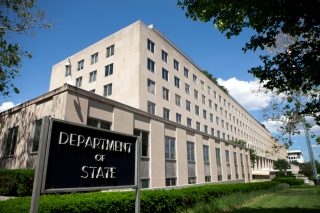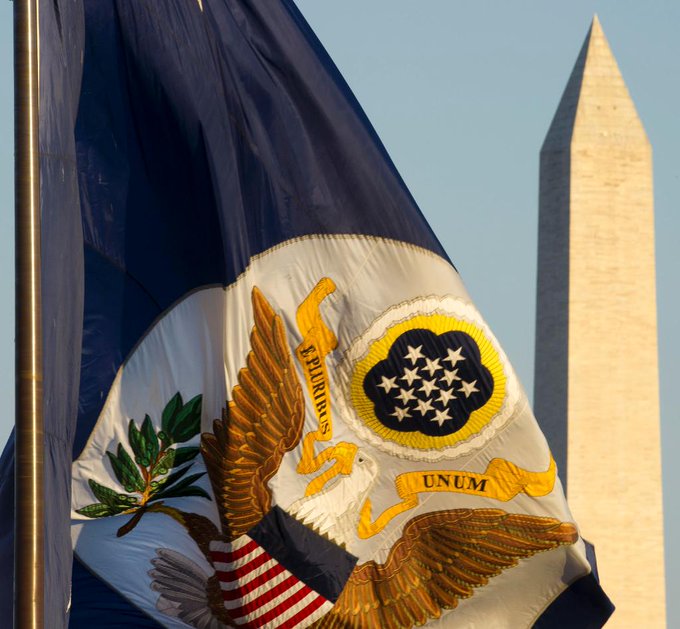
(Getty)
A U.S. Department of State employee with access to classified information has been charged with lying to the F.B.I. in relation to a counterintelligence investigation involving agents from China.
Candace Marie Claiborne, an employee of the Office of Caucasus Affairs in the State Department, was charged by the Department of Justice with obstructing an official proceeding and making false statements to the F.B.I. She pleaded “not guilty” to the charges in a federal court March 29.
The DOJ unsealed a federal complaint March 28 that says Claiborne, 60, allegedly concealed contact that she had foreign with foreign intelligence over a period of years. Officials said that she and a “co-conspirator” received lavish gifts from the agents in exchange for information pertaining to Chinese and U.S. relations.
The complaint said that Claiborne once labeled the pair as “spies” to a co-conspirator in the case. To view the full federal criminal complaint, read the document below.
Candace Claiborne Complaint by Chris on Scribd
Claiborne will appear in court in D.C. on April 18 before the Honorable Magistrate Judge Robin M. Meriweather.
Here’s what you need to know:
1. A Male Subject & Claiborne Are Accused of Receiving Thousands of Dollars in Gifts & Cash From Chinese Intelligence Agents
According to the criminal complaint, over the span of five years — starting in 2011 — Claiborne and a male co-conspirator requested and received numerous gifts from the two intelligence agents in China.
Those include cash being wired directly to bank accounts, an iPhone, international vacations, a fully-furnished apartment, tuition at a Chinese fashion school, a sewing machine, medication, slippers and a monthly stipend.
There are four subjects — including Claiborne — listed in the affidavit. “Co-conspirator A” also accepted illicit gifts from the agents, listed as “co-conspirator B” and “C” in the court filing.
Here’s a full list of gifts Claiborne and “co-conspirator A” allegedly received from the two agents:
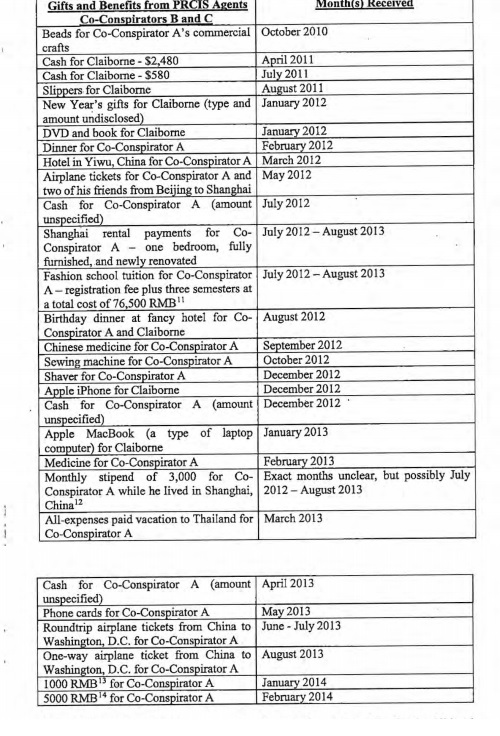
The list of gifts allegedly given from Chinese agents to Claiborne and “co-conspirator A” (Court Filing)
“Co-conspirator A” lives in Los Angeles and previously graduated from Salisbury University in Maryland. He lived in China from 2000-2005 and then again from 2012-13. In the most recent stay, he studied fashion design at Donghua University in Shanghai.
Most notably, he was allegedly charged with a serious felony crime in China, but the two agents moved in to prevent the police from investigating him, the complaint said.
“Co-conspirator B” is based out of Shanghai and runs a spa and a restaurant in the city. He’s an importer/exporter and is a Chinese citizen that’s worked closely with “co-conspirator C.”
Claiborne allegedly received money wired from the agents in the amount of $2,480 on at least one occasion and requested and received even more other times.
After the first money wire transaction, the Chinese agents requested Claiborne give them an internal analyses of the U.S.-Sino Strategic Economic Dialogue. Specifically, as stated in the affidavit, they wanted to know more about the “internal evaluation of the fruits and consensus … made by the U.S government.” In addition, one of the agents requested information on what kind of pressures the U.S. government intended on placing on the Chinese government if expectations weren’t met.
The dialogue is considered the highest-level of forum to speak about a range of issues between China and the U.S.
Claiborne allegedly provided the agents with the information, but it’s the same that was publicly available. After seeing that the information was unclassified, at least one of the agents asked Claiborne for “what they cannot find on the internet.”
To avoid getting tracked by investigators, instead of getting the information via email, the agent allegedly said he would pick up the documents in person from Claiborne.
When Claiborne no longer worked in China to meet face-to-face, it’s alleged that she used a Chinese-based social media application to communicate.
One occasion included her allegedly asking one of the agents to wire her $5,000, but she quickly learned that she was to have a national security background interview shortly thereafter. Because of the interview, she changed courses and requested that the agent wait until after the interview to wire the money.
Once the interview was conducted, she grew suspicious that she may get caught and allegedly asked the agent to “not transfer the money” and “delete all correspondence” about the request.
When Claiborne was returning to D.C. from a trip abroad, she was taken into secondary screening and was asked to unlock her cell phone while agents rummaged through her personal belongings with her not present.
Because of the incident, she filed a complaint she filed with the Customs and Border Patrol. The F.B.I. followed-up with an interview because of the claim and Claiborne once again allegedly lied to investigators. She mentioned nothing about “co-conspirator A’s” travels and her foreign contacts.
Incredibly, hours after the interview, Claiborne made a call from a phone booth in the State Department building to “co-conspirator A,” trying to persuade him to “falsely recall the origin of educational benefits he received from the agents,” the complaint said. She advised him it’s probably best to “stay away from China for now.”
2. Claiborne Holds a Top Secret Security Clearance & Allegedly Lied to the FBI After Accusing the Chinese Intel Agents of Being ‘Spies’
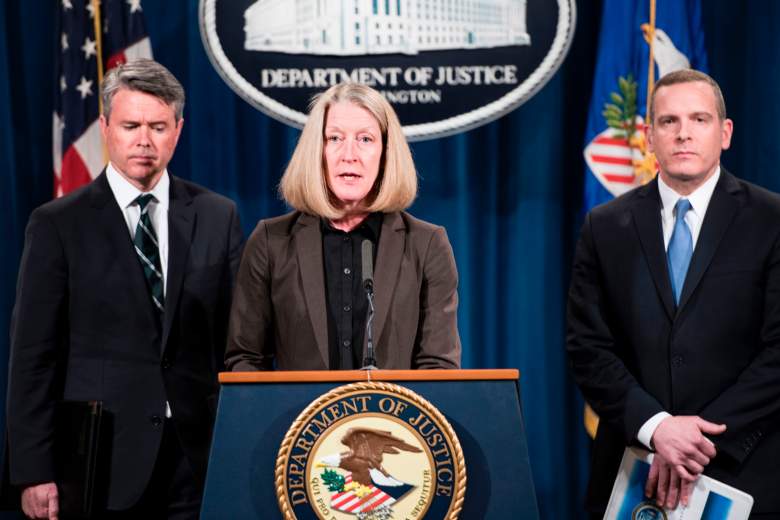
Acting Assistant Attorney General of National Security Mary McCord speaks in 2014. McCord announced federal charges against Candace Marie Claiborne on March 29. (Getty)
With her position in the government, Claiborne holds a Top Secret security clearance.
In obtaining such a clearance with the government, Claiborne had to complete various background questionnaires and renew the clearance once every five years. Her most recent renewal process took place in 2014.
The federal affidavit says that Claiborne “deliberately excluded any mention of ‘co-conspirators B’ and ‘C,’ even though truthful answers required disclosure of their names and identities.”
When investigators interviewed Claiborne, she continued to withhold the contact information and also allegedly “misled” investigators about “co-conspirator A’s” travels, studies and residency in China.
Acting Assistant Attorney General Mary McCord said after announcing the charges that it was clear Claiborne used her clearance for her own personal gain.
Claiborne used her position and her access to sensitive diplomatic data for personal profit. Pursuing those who imperil our national security for personal gain will remain a key priority of the National Security Division.
The complaint against Claiborne said she “willfully misled State Department background investigators and F.B.I. investigators” about her relationship with the two Chinese officials, even though she allegedly explained to “co-conspirator A” that the agents were “spies.”
When Claiborne was contacted by federal investigators, she allegedly told the Chinese agents to “delete evidence” proving their relationship.
In addition, under the guise of a birthday message, Claiborne allegedly emailed “co-conspirator A” to delete all messages pertaining to the Chinese agents.
According to the complaint, the email said:
“I hope you enjoyed your day. May Al1ah bless you with health and happiness. Btw delete all email messages and contact information in your email and phone pertaining to [Co-Conspirator B] and [Co-Conspirator
C] — I don’t want any trouble going forward ok — please do this immediately! Messages, nos, (anything) having to do with that fashion school your apartment anything -= even from wechat, fb, slqpe, etc u got me?
Shortly after that, an undercover F.B.I. agent, posing to be a colleague of the two Chinese agents, waited outside Caliborne’s D.C. home as she returned home from work. After a short explanation to who he was, she invited the agent inside and admitted her relationship with the foreign contacts in a conversation that lasted nearly two hours.
U.S. Attorney of the District of Columbia Channing D. Phillips said that Claiborne knew full well the need for caution and being transparent with her job.
As a State Department employee with a Top Secret clearance, she received training and briefing about the need for caution and transparency. This case demonstrates that U.S. government employees will be held accountable for failing to honor the trust placed in them when they take on such sensitive assignments.
3. Claiborne Has Been an Employee of the Department of State Since 1999 & Lived With Her Accomplice In Shanghai
According to the affidavit, Claiborne has a bachelor’s degree in criminal justice and law enforcement from the University of the District of Columbia and still lives in the area. She started working for the Department of State in 1999 as an office management specialist.
In her time working in the role, she’s traveled abroad to foreign embassies in Baghdad, Iraq, Khartoum, Sudan, Beijing and Shanghai, China.
The affidavit says that Claiborne’s first duty post was at the U.S. Embassy in Beijing in March 2000. She worked in her position for the economic minister counselor as well as the security engineering center. Her tour concluded around June 2003, but her next one was at the U.S. Consulate General in Shanghai.
In Shanghai, Claiborne worked from August 2003-July 2005 and lived with “co-conspirator A” as he recently graduated college. She completed that tour and continued on her foreign stays until returning to China in 2009 and staying there until November 2012.
State Department spokesman Mark Toner said that the agency “vigorously investigates” claims whenever a public servant is suspected of misconduct. He added that the investigation is ongoing and the State Department is working with the DOJ and F.B.I.
4. Claiborne Had a Journal Where She Wrote About Her Misconduct
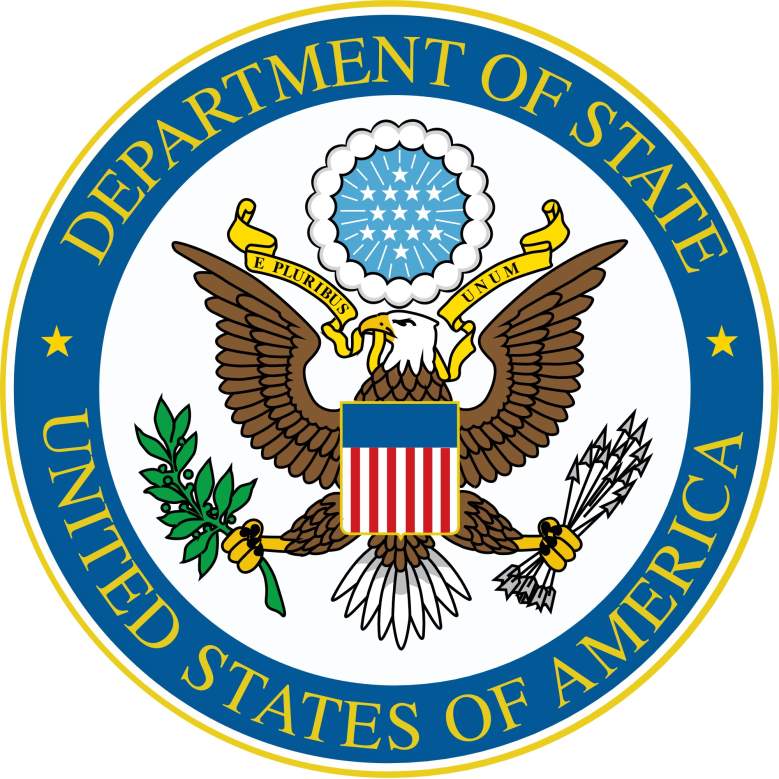
(WikiMedia)
The DOJ press release told how Claiborne kept record of many of her illicit transactions with the agents.
The affidavit claims that on July 10, 2015, the F.B.I. conducted a search of a storage facility where Claiborne’s belongings were. They found the journal where she had at least one entry that said she was able to “generate 20k in 1 year” by working with one of the Chinese agents.
The journal also had an entry that tasked her to “clean up yahoo email contacts.” Claiborne had used a Yahoo! email address to communicate with the Chinese agents.
5. The Maximum Penalty Claiborne Faces Is 25 Years In a Federal Prison
A federal prosecutor told Reuters that surveillance of Claiborne took place under the Foreign Intelligence Surveillance Act. It’s a federal law that from 1978 allows for the electronic surveillance and collection of foreign intelligence information from agents that are in conversation with those of foreign powers.
From the affidavit, it appears the long investigation of Claiborne included tapping her phone lines and gathering physical evidence from her email.
Claiborne was arrested by F.B.I. agents March 28 when she arrived at the field office in Washington D.C. for a voluntary interview. During that, she claimed that her relationship with the Chinese agents began as a friendship, but she stuck with it even though she realized they were “seeking information on behalf of the PRC government.”
She admitted to agents that she passed information along to the agents numerous times, although she said it was always “unclassified information.”
The maximum penalty a person who’s convicted of the “obstructing and official proceeding” is 20 years imprisonment, and it’s five years for “making false statements to the F.B.I.”
If convicted of both the felony charges, Claiborne faces a maximum penalty of 25 years in prison.
